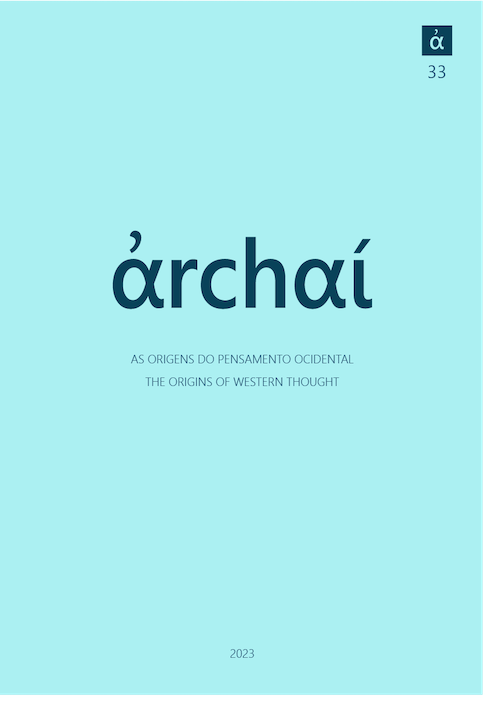The gap between Parmenides’ argument on Being and his cosmology in the Aristotelian account
DOI:
https://doi.org/10.14195/1984-249X_33_25Keywords:
Parmenides, Eleatism, Aristotle, Monism, CosmologyAbstract
In some of the Aristotelian accounts, Parmenides’ thesis is construed in opposition to the philosophy of nature; on the other hand, he is also depicted, in a different context, as a cosmologist, to whom the Stagirite (and a long tradition afterwards, ending with Simplicius) ascribes a theory of becoming and its principles. In this paper, I exhibit and analyse the relevant passages from Physics I 1-3, Metaphysics I 3 and 5 and On generation and corruption I 3, providing an interpretation that aims to solve the apparent paradox, making sense of the information we can gather from Aristotle’s and Simplicius’ testimonies. Eventually, I propose a construal of the Two Ways of fr. 2 with an emphasis on the predicative reading of einai, which could hint at the Parmenidean approach to cosmology that runs in parallel with the argument on Being.
Downloads
References
ALGRA, K. (2004). On generation and corruption i. 3: Substantial change and the problem of not-being. In: HAAS, F. DE; MANSFELD, J. (Eds.). On generation and corruption, book i Symposium aristotelicum. Oxford, Oxford University Press.
BALTUSSEN, H.; ATKINSON, M.; SHARE, M.; MUELLER, I. (2012). Simplicius. On Aristotle Physics 1.5-9 London, Bristol classical Press.
BÄUMKER, C. (1886). Die Einheit des parmenideischen Seienden. Jahrbucher für klassische Philologie 133, p. 541-561.
BRANDIS, C. A. (1813). Commentationum Eleaticarum pars prima. Xenophanis, Parmenidis et Melissi doctrina e propriis philosophorum reliquiis veterumque auctorum testimoniis Altona, J. F. Hammerich.
KARSTEN, S. (Ed.) (1835). Parmenidis Eleatae carminis reliquiae Amsterdam, J. Müller.
CHARLTON, W. (1970). Aristotle. Physics: Books I and II Oxford, Oxford University Press .
CLARKE, T. (2019). Aristotle and the Eleatic One Oxford, Oxford University Press .
CONTE, B. (2020). Doxa, Diakosmêsis and Being in Parmenides’ poem. Anais de Filosofia Clássica 27, p. 176-197.
CORDERO, N.-L. (1987). L’histoire du text de Parménide. In: AUBENQUE, P. (Ed.). Études sur Parménide Volume II: Problémes d’interprétation. Paris, Vrin. p. 3-24.
CORDERO, N.-L. (2010). The “Doxa of Parmenides” dismantled. Ancient Philosophy 30, n. 2, p. 231-246.
CORNFORD, F. M. (1933). Parmenides’ Two Ways. The Classical Quarterly 27, p. 97-111.
COULOUBARITSIS, L. (2008). La pensée de Parménide Bruxelles, Ousia.
COXON, A. H.; MCKIRAHAN, R. (Eds.) (2009). The fragments of Parmenides Rev. and expanded ed. Las Vegas/Zurich/Athens, Parmenides Publishing.
DIELS, H. (1887). Über die ältesten Philosophieschulen der Griechen. In: FISCHER, V. Philosophische Aufsätze: Eduard Zeller zu seinem fünfzigjährigen Doctor-Jubiläum gewidmet Leipzig, Fues.
FÜLLEBORN, G. G. (1795). Fragmente des Parmenides. Neu gesammelt, übersetz und erläutert. In: FÜLLEBORN, G. G. (Ed.). Beyträge zur Geschichte der Philosophie VI. Züllichau;Freistadt, Frommannische Buchhandlung. p. 1-102.
FURLEY, D.; GALLOP, D. (1991). Parmenides of Elea: fragments. Toronto, University of Toronto Press.
JOACHIM, H. H. (1984). Aristotle. On generation and corruption. In: BARNES, J. (Ed.). Complete works of Aristotle Princeton, Princeton University Press.
JOURNÉE, G. (2014). Les avatars d’une démone : À propos de Parménide fr. 28B13. Elenchos 35, n. 1, p. 5-38.
LAKS, A.; MOST, G. W. (Eds.) (2016). Les débuts de la philosophie: Des premiers penseurs grecs à socrate Paris, Fayard.
MCDIARMID, J. B. (1953). Theophrastus on the presocratic causes. Harvard Studies in Classical Philology 61, p. 85-156.
MORRISON, J. S. (1955). Parmenides and Er. Journal of Hellenic Studies 75, p. 59.
MOURELATOS, A. P. D. (2008). The route of Parmenides Las Vegas/Zurich/Athens, Parmenides Publishing .
PULPITO, M. (2011). Parmenides and the forms. In: CORDERO, N.-L. (Ed.). Parmenides, venerable and awesome (Plato, Theaetetus 183e):proceedings of the international symposium Las Vegas, Parmenides Publishing, p. 191-212.
RASHED, M. (2005). Introduction. In: RASHED, M. (Ed.). Aristote de la génération et de la corruption Paris, Les Belles Lettres.
ROSS, D. (1924). Aristotle’s Metaphysics I. Oxford, Clarendon.
ROSSI, G. (2006). Desanudando argumentos. Las aplicaciones filosóficas de la dialéctica según las refutaciones sofísticas Méthexis 19, n. 1, p. 79-109.
TIEDEMANN, D. (1791). Geist der spekulativen philosophie: Von Thales bis Sokrates Marburg, Akademische Buchhandlung.
WEDIN, M. V. (2014). Parmenides’ grand deduction: A logical reconstruction of the way of truth Oxford, Oxford University Press .
YEBRA, V.G. (1982). Aristóteles. Metafísica Madrid, Gredos.
ZELLER, E. (1869). Die Philosophie der Griechen in ihrer geschichtlichen Entwicklung 1. Leipzig, L. F. Fues.
Downloads
Published
How to Cite
Issue
Section
License
Copyright (c) 2023 Bruno Loureiro Conte

This work is licensed under a Creative Commons Attribution 4.0 International License.
Given the public access policy of the journal, the use of the published texts is free, with the obligation of recognizing the original authorship and the first publication in this journal. The authors of the published contributions are entirely and exclusively responsible for their contents.
1. The authors authorize the publication of the article in this journal.
2. The authors guarantee that the contribution is original, and take full responsibility for its content in case of impugnation by third parties.
3. The authors guarantee that the contribution is not under evaluation in another journal.
4. The authors keep the copyright and convey to the journal the right of first publication, the work being licensed under a Creative Commons Attribution License-BY.
5. The authors are allowed and stimulated to publicize and distribute their work on-line after the publication in the journal.
6. The authors of the approved works authorize the journal to distribute their content, after publication, for reproduction in content indexes, virtual libraries and similars.
7. The editors reserve the right to make adjustments to the text and to adequate the article to the editorial rules of the journal.



